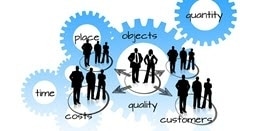In today’s competitive markets, the optimization of MRO supply chains is a hot issue, especially when it comes to process efficiencies within a company.

With data coming in from so many different sources and stakeholder groups all wanting to benefit in their own way, the root problems of the MRO supply chain grows in both scale and complexity.
These factors have companies big and small turning to MRO service providers to optimize their process.
We’ve compiled a list of 6 things to look for in an MRO provider to give decision makers insight into what key attributes and abilities any reputable MRO company should possess.
1. Effective Data Standardization & Management Strategies
Clean data is the cornerstone of any modern company and a critical part of any successful MRO solution. Effective data management provides visibility and empowers better decisions that translate into a competitive advantage.
It all starts with a baseline. Once you measure your baseline, you can launch continuous improvement measures. Processes are streamlined, workflow improves and productivity increases. Redundant practices are eliminated and the entire organization saves time and money..
2. Beneficial Sourcing and Supplier Relationship Building Tactics
After completely cleansing the data and achieving a clear understanding of the unique targets and goals of the company, an integrated supplier should establish productive relationships with your existing supply base and seek mutually beneficial relationships with new suppliers.
The goal is to source the right product from the right supplier based on client requirements, which includes:
- Fit
- Form and function
- Delivery
- Price
An effective MRO service provider should provide strategic sourcing recommendations that include:
- Right sourcing
- Supplier consolidation
- Re-sourcing
- Product standardization
- Performance management
- Risk assessment
- Continuity of supply
3. Efficient, Centralized P2P Transaction Services
Business Process Outsourcers (BPOs) should manage all MRO transaction services from requisition through supplier payment, including:
- Order processing
- Order confirmation
- Order expediting
- Receiving
- Returns
- Supplier invoice reconciliation
- Three-way match
- Supplier payment for goods and services
By implementing a BPO solution, manufacturers benefit from streamlined processes, compliance to negotiated contracts and leveraged category knowledge, as well as improved efficiency and accuracy of the transactions that flow throughout the company. This translates to controls and compliance resulting in increased savings for both clients as well as suppliers.
4. Best-In-Class Storeroom Operations Resources
BPO’s should provide qualified, experienced on-site staff to operate storeroom activities, manage inventory and deliver premier customer service to the manufacturer’s stakeholders.
More than just knowledgeable staff, storeroom operations should be driven by proven processes that are customized to meet the clients’ unique requirements.
These processes and resources need to be supported by state-of-the-art, MRO purpose-built technology to deliver efficient storeroom management and long-term, continuous improvement.
5. Inventory Optimization Techniques
Traditionally, inventory has been managed with a min/max or over/under approach. Specialized systems customized for MRO by BPO service providers should look to improve upon that method by analyzing data, recognizing patterns and utilizing demand planning to predict specifically for each part and process. This leads to optimized inventories as well as reduced excess overhead and freight costs in the process.
6. State of the Art Technology and a Focus on Continuous Improvement
Third party organizations have the advantage of being focused exclusively on the purpose-built custom systems and technology required to support MRO process and operations, optimize the entire MRO supply chain and provide sustained value through continuous improvement efforts.
Traditional ERP systems are not designed specifically with MRO in mind. While the efficient management of MRO may be consistent across businesses, a knowledgeable MRO company should have custom technology used to support their process; this in turn optimizes the benefits to their clients.
And while many MRO distributors have technology built-in to support their clients, the difference for an integrated MRO process is that the platform manages the process rather than just overseeing the specific function of purchasing.
Additionally, MRO companies that truly focus on continuous improvement will also have reliability engineers to help you enable sustainable production by eliminating unexpected equipment downtime and improving MRO process reliability, all the while reducing the total cost of your MRO.
MRO Providers Who Do It All, Not Just Some
To sum it up, when choosing an MRO partner, these 6 key points should be the basis of your decision, first and foremost. If an MRO provider can only provide a few of these services, the work will have diminishing returns and the supply chain will continue to show significant flaws.
When you decide on an MRO service provider, use this checklist to make sure your provider has what it takes to compete in the fast-paced, continually evolving industry of supply chain management.
Connect with us today to learn more about SDI’s approach to supply chain management.


